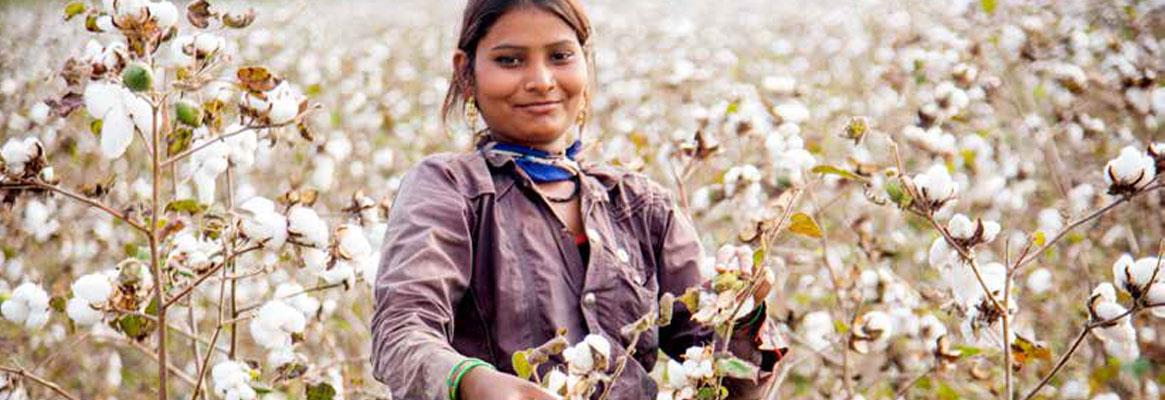Smallholder farmers are key actors in global production systems but are often less likely to have the resources, opportunities, and voice needed to manage risk and maintain their livelihoods when hit with shocks like COVID-19. A recent research paper outlines how farmers are dealing with the effects of the pandemic and whether certification has helped them cope. A report.
Every industry/sector has its own set, or even sets, of vulnerable communities working in the economic system. The textiles-apparel-fashion industry has many of those. While conditions of garment workers remain in the news for one reason or another, smallholder producers in agriculture remain relatively more marginalised. But this community has tremendous potential, in that it can do more than their tiny bit for the sustainability objectives of the industry. It works both ways: voluntary sustainability standards (VSSs) can help smallholder producers become more resilient, and VSSs in turn can strengthen the supply chains.
That’s the central argument that comes out of a policy brief titled ‘Coping with COVID-19: Certification Supports Farmer Resilience’ prepared by the International Institute for Sustainable Development (IISD), an independent thinktank working to accelerate solutions for a stable climate, sustainable resource management and fair economies. The policy brief is from its State of Sustainability Initiatives (SSI) research project that provides credible information about how VSSs can support better environmental and social performance in important commodity sectors.
Sara Elder, paper author and IISD Policy Advisor, surveyed 57 supply chain actors to find out how farmers were dealing with the effects of the covid-19 pandemic and whether certification had helped them cope. The study focused on six key commodity sectors: rice in Cambodia, cotton in India, avocado in Colombia, banana in Guatemala, cashew in Guinea-Bissau, and coffee in Rwanda. The results suggest that VSSs can indeed help smallholder producers be more resilient. “We found that standards support higher prices and premiums, stronger supply chain relationships, market diversification, and training for producers,” says Elder. “But certification does not offer full protection from economic shocks.”
The interviewees who spoke to IISD about cotton farming in India said they used or interacted with Organic, Fairtrade International and Better Cotton Initiative (BCI). At the time of the study, farmers were just beginning to come out of the doldrums of the first wave. “As our research was conducted in India during December 2020 and January 2021 the findings refer to the first wave of the pandemic, and we cannot speak directly to the second wave happening now. However, our research does suggest that producers who are organised in groups and connected with NGOs, buyers, and other supply chain actors can more easily access certification as well as supporting services and safety nets that can help them cope with crises,” says Elder.
The policy brief notes: “While prices for conventional cotton and some VSScompliant cotton dropped below the government minimum support price, niche markets continued to sell and command a premium despite covid-19.” Elder explains: “As very niche markets, demand for organic and extra-long staple cotton was not affected by covid-19 and continued to command a premium despite the general price drop for cotton at the start of the pandemic. During covid-19, the price for (nonniche market) cotton dropped below the government of India’s minimum support price (MSP); so, farmers sold VSScompliant cotton that does not receive a set premium (e.g. BCI) as conventional cotton to the Cotton Corporation of India to receive the MSP.”
The research found that the farmers who were part of the standards had better connectivity and knew exactly (how) despite all the disruptions that they could still sell. Elder elaborates: “VSS compliance can mean stronger supply chain relationships between producers and buyers that support secure access to inputs, services, markets, and faster recovery from shocks such as covid-19. During covid-19, VSS-compliant producers with strong connections to buyers enjoyed more secure market access or a faster recovery of market access. In India, farmers with direct contact with buyers have better communication with those buyers and can access support. For example, one buyer of Indian cotton obtained special permission from authorities to continue to provide services and timely delivery of seeds and other inputs to their VSS-compliant suppliers despite the lockdown. The buyer kept their orders intact, was able to respect all contracts, and still paid a price for organic cotton that was fixed over the market price.”
The study suggests five ways through which governments can do to build smallholders’ resilience:
•Enact policies and programmes to incentivise and boost the consumption of sustainable (including VSS-compliant) commodities. This could include taxes and charges to raise prices on less sustainable products and/or grants, donations, or tax reductions to subsidise more sustainably grown commodities and make them more appealing to consumers.
•Establish regulatory frameworks to influence agricultural practices and promote sustainable sourcing, including mechanisms that enable smallholder farmers to implement sustainable and climate-smart agricultural practices.
•Support producer organisations and help connect them with supply chain actors domestically and internationally, including buyers and non-governmental organisations that can provide regular services and safety nets to farmers.
•Adapt and extend social protection programmes, such as cash transfers, and implement resilience funds to support recovery in times of shock.
•Establish minimum producer prices to ensure a living income for producers, which can support producer livelihoods and their capacity to adapt to shocks.
This becomes crucial in India where small farmers are a huge chunk. Herein, the textiles-apparel industry can do its bit too. Elder offers five suggestions:
•Promote and incentivise consumption of products made with sustainable (including VSScompliant) cotton.
•Provide grants and training as well as monetary incentives to support smallholder implementation of sustainable and climate-smart agricultural practices and positive sustainability performance.
•Work with producer organisations to understand their challenges and support their solutions.
•Offer insurance mechanisms and resilience funds that can be safety nets that help producers cope with and recover from shocks such as covid-19.
Pay minimum producer prices to ensure a living income for producers.
This article was first published in the May 2021 edition of the print magazine.









Comments